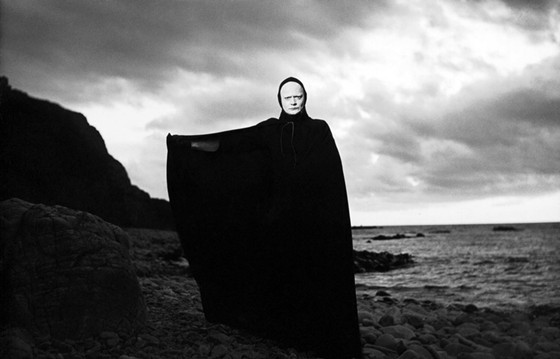
pes•si•mism (ˈpɛs əˌmɪz əm)
n.
1.the tendency to see only what is disadvantageous or gloomy or to anticipate the worst outcome.
2.the doctrine that the existing world is the worst of all possible worlds or that all things naturally tend toward evil.
3.the belief that the evil and pain in the worldoutweigh any goodness or happiness.
“If man merely sat back and thought about his impending termination, and his terrifying insignificance and aloneness in the cosmos, he would surely go mad, or succumb to a numbing sense of futility. Why, he might ask himself, should he bother to write a great symphony, or strive to make a living, or even to love another, when he is no more than a momentary microbe on a dust mote whirling through the unimaginable immensity of space? … Those of us who are forced by their own sensibilities to view their lives in this perspective — who recognize that there is no purpose they can comprehend and that amidst a countless myriad of stars their existence goes unknown and unchronicled — can fall prey all too easily to the ultimate anomie. … The world’s religions, for all their parochialism, did supply a kind of consolation for this great ache … This shattering recognition of our mortality is at the root of far more mental illness than I suspect even psychiatrists are aware.”
– Stanley Kubrick, interview for Playboy magazine (September 1968)
“Life’s but a walking shadow, a poor player That struts and frets his hour upon the stage, And then is heard no more. It is a tale Told by an idiot, full of sound and fury, Signifying nothing.”
– William Shakespeare, from “The Tragedy Of Macbeth” (circa 1599-1606); Act V; Scene V
“It is the courage to make a clean breast of it in the face of every question that makes the philosopher. He must be like Sophocles’ Oedipus, who, seeking enlightenment concerning his terrible fate, pursues his indefatigable inquiry even though he divines that appalling horror awaits him in the answer. But most of us carry with us the Jocasta in our hearts, who begs Oedipus, for god’s sake, not to inquire further.”
– Arthur Schopenhauer; in a letter addressed to Johann Wolfgang von Goethe, 1819
“There are two things which make it impossible to believe that this world is the successful work of an all-wise, all-good, and, at the same time, all-powerful being; firstly, the misery which abounds in it everywhere; and secondly, the obvious imperfection of its highest product, man, who is a burlesque of what he should be.”
– Arthur Schopenhauer, from his “On The Suffering Of The World”, (1850)
“Only those are happy who never think or, rather, who only think about life’s bare necessities, and to think about such things means not to think at all. True thinking resembles a demon who muddies the spring of life or a sickness which corrupts its roots. To think all the time, to raise questions, to doubt your own destiny, to feel the weariness of living, to be worn out to the point of exhaustion by thoughts and life, to leave behind you, as symbols of your life’s drama, a trail of smoke and blood – all this means you are so unhappy that reflection and thinking appear as a curse causing a violent revulsion in you.”
– Emil Cioran, from On The Heights Of Despair (1934).
“Nothing proves that we are more than nothing.”
– Emil Cioran, from A Short History Of Decay (1949).
“When people come to me saying they want to kill themselves, I tell them, “What’s your rush? You can kill yourself any time you like. So calm down. Suicide is a positive act.” And they do calm down.”
– Emil Cioran, from The Trouble With Being Born (1973).
“There have been times when I’ve thought of suicide but with my luck it’d probably be a temporary solution.”
– Woody Allen, from The New York Times (December 1st, 1975).
“As a filmmaker, I’m not interested in 9/11 […] it’s too small, history overwhelms it. The history of the world is like: He kills me, I kill him, only with different cosmetics and different castings. So in 2001, some fanatics killed some Americans, and now some Americans are killing some Iraqis. And in my childhood, some Nazis killed Jews. And now, some Jewish people and some Palestinians are killing each other. Political questions, if you go back thousands of years, are ephemeral, not important. History is the same thing over and over again.”
– Woody Allen, from Der Spiegel (June 20th, 2005).
“This is my perspective and has always been my perspective on life: I have a very grim, pessimistic view of it. I always have, since I was a little boy. It hasn’t gotten worse with age or anything. I do feel that it’s a grim, painful, nightmarish, meaningless experience, and that the only way that you can be happy is if you tell yourself some lies and deceive yourself.”
– Woody Allen, from the press conference for ”You Will Meet a Tall Dark Stranger” at the Cannes Film Festival (2011).
“Scientists are confirming more and more that all existence is here by blind chance; no purpose, no design.”
“Faith is the path of least resistance.”
“Sophocles once said, ‘To never have been born may be the greatest boon of all.’”
– Chris Wilton (Jonathan Rhys-Meyers) in Woody Allen’s “Match Point” (2005)
“Life on Earth is evil.”
– Justine (Kirsten Dunst) in Lars von Trier’s “Melancholia” (2011)
Philosophical pessimism is a worldview and a set of ideas proposed, driven, expressed, studied, explored and encouraged by a number of philosophers, artists and others. It claims that life, existence and humankind hold a negative value, if they do hold any value at all to begin with. Most of the time, the great genius German philosopher Arthur Schopenhauer (February 22, 1788 – September 21, 1860) is credited as the so-called “father” of philosophical pessimism.
One of the key theses of this worldview and mostly loose group of ideas is the encouragement of man to look directly at the dark sides of life, existence, nature, the human species and himself, and rid himself of any hopes or faith in anything “good”.
Joshua Foa Dienstag, professor of political science at the University of California, Los Angeles, argues in his book “Pessimism: Philosophy, Ethic, Spirit” (2006) that some of the main propositions of philosophical pessimism are “that time is a burden; that the course of history is in some sense ironic; that freedom and happiness are incompatible; and that human existence is absurd.”
The human species’ ability to have developed consciousness thanks to evolution is seen as yet another source of pain and misery, since humans are therefore fully aware of evil, the suffering of others’, emotions, the fragility of existence, the true savage and indifferent nature of the world and the universe, and the inevitability of death.
We’ll now briefly discuss, in alphabetical order, 10 great films that deal with, tackle, express, explore, analyze, show or demonstrate philosophical pessimism.
1. Barry Lyndon (Stanley Kubrick, 1975)
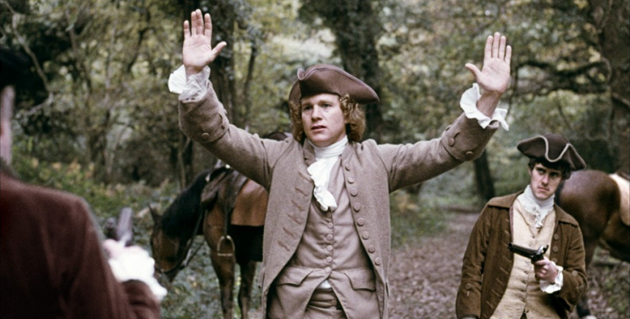
Stanley Kubrick’s seventh masterpiece, based on the novel “The Luck Of Barry Lyndon from 1844” by English author William Makepeace Thackeray, deals with the story of Redmond Barry, an Irish man who, due to the death of his father in a duel arising over the purchase of a couple of horses, grows up in poverty and manages to “acquire the style and title of Barry Lyndon”.
Redmond is infatuated with his noble cousin Nora, who’s well aware of this fact and likes to use it to manipulate and toy with Redmond for mere pleasure and due to her own narcissism and sense of entitlement.
Nora’s family, eager to escalate in power and wealth, encourage Nora’s desire to marry wealthy Army Captain John Quin, upsetting Redmond so much that he challenges Quin to a duel, where he injures him and finds himself forced to flee, due to Quin’s stature. However, at a point during his escape, he’s robbed of his horse, pistol and the very small amount of money he was carrying.
Redmond eventually joins the British Army during the Seven Years’ War and then deserts and steals an officer’s identity. The next few years he makes a living as a con man disguised as a professional gambler, playing with the elites at the most prestigious Courts of Europe.
This is how he crosses paths with the Countess of Lyndon, a young, beautiful woman married to a very old, severely ill, and of course and most importantly, incredibly wealthy nobleman, Sir Charles Lyndon, with whom he has a son, Lord Bullingdon. Redmond and Lady Lyndon are instantly attracted to each other. Lady Lyndon makes herself instantly available to Redmond and her husband, (possibly from the distress of knowing of his wife’s betrayal) quickly dies.
With Lyndon out of the way, Redmond and Lady Lyndon marry, much to the disapproval and disappointment of the 10-year-old Lord Bullingdon, who’s convinced Redmond’s only interested in his mother’s position and wealth, which, of course, are actually her dead first husband’s position and wealth. Redmond takes the name of his new wife, which, again, is obviously actually her first dead husband’s name; and therefore officially becomes Barry Lyndon.
What then follows is a series of demonstrations of the character’s true natures, which they hide under the hypocritical and repressive façade of nobility, elegance, “taste”, courtesy, etiquette and manners, all to hide their animalistic, violent and selfish characters.
Barry is physically abusive toward Lord Bullingdon, openly cheats on his wife with every woman that crosses his path (including the “help”), splurges the family’s money, and is obsessed with status and with obtaining the favor and approval of the highest elites of England, by whatever means necessary. Neither Barry nor his wife ever do any actual “work” at all, of course, simply living off of Sir Charles Lyndon’s title, wealth and fortune.
The miserably married couple have a son, Bryan Patrick Lyndon, whom Barry adores and spoils to ridiculous degrees, conceding to every single one of his wishes and whims. Barry’s mother can no longer resist living off of the late Lyndon’s money and comes to live at the family manor and then warns Barry that if his wife died, all the money would go to Lord Bullingdon, and Barry becomes even more obsessed with gaining the elite’s approval and favor, in hopes of getting a title all of his own.
At a birthday party for Lady Lyndon, however, Lord Bullingdon, now grown up, shows his contempt towards Barry and his opportunism, which causes Barry to go crazy and physically attack and assault Bullingdon, creating a huge scandal, which results in him being forsaken and ignored by the people he so desperately wanted to win over.
Bryan decides he wants a horse, and Barry, of course, buys it for him. One day, the horse throws the boy, causing him to have a severe and fatal fall. Barry turns further to alcohol and orgies to seek oblivion and his wife to self-pity and religious fanaticism and obsession.
Due to his severe alcoholism, Barry is left totally impaired, with his mother taking charge. It is then that she fires Reverend Runt, Lady Lyndon’s personal chaplain, which causes the hysterical woman to throw a tantrum and fake a suicide attempt. The news reaches Lord Bullingdon, who decides to return to the manor and settle things once and for all by challenging Barry to a duel.
Bullingdon is conceded with the first shot, but the sheltered and cowardly nobleman fails to shoot. Barry, overcome by despondency, apathy and indifference, shoots at the floor. Bullingdon insists on firing again, which he does, shooting Barry in his left leg, which has to be amputated later.
Now Barry is filled with gargantuan debts and missing one leg. Bullingdon offers him an allowance of five hundred guineas a year in exchange of leaving England and never returning again. Barry is forced to accept, since otherwise he’d have to spend the rest of his life in prison due to the never-paid debts.
With practically no money, with no title, no son, no wife, no house to call his own and missing a leg, Barry returns to Ireland with his mother and never sees Lady Lyndon again.
As an epilogue, Kubrick places a title card that reads:
“IT WAS IN THE REIGN OF GEORGE III THAT THE AFORESAID PERSONAGES LIVED AND QUARRELLED; GOOD OR BAD, HANDSOME OR UGLY, RICH OR POOR, THEY ARE ALL EQUAL NOW.”
2. Match Point (Woody Allen, 2005)
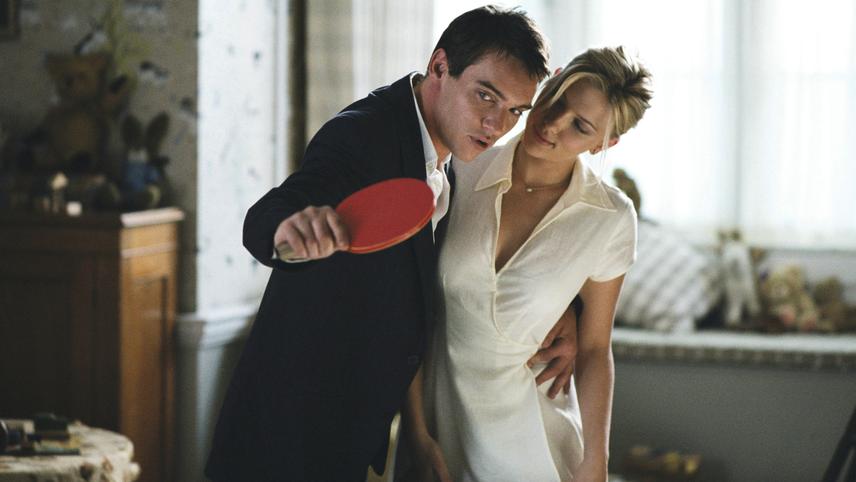
match point
1.: a situation (as in tennis) in which one player or side will win the match by winning the next point; also : the point itself
– Merriam-Webster Dictionary.
Woody Allen’s most pessimistic film (which means it’s practically as pessimistic as pessimism can possibly be) starts with a static shot of a tennis net with the ball going repeatedly from one side to the other, at one time hitting the net and then floating above it for mere fractions of a second.
Our protagonist, Chris Wilton (played by Jonathan Rhys Meyers in an absolutely mesmerizing and unbelievable performance for the ages), an Irish former tennis champion from a very poor background, explains that in that miniscule amount of time, the ball can either go forward, and the game is won, or it can go backwards, and the game is lost.
After quitting tennis professionally, Chris moves to London, lands a job as a tennis teacher in the most exclusive sports club in the city, and rents a miniscule apartment. Thanks to his new job, he meets Tom Hewett, the son of multimillionaire Alec Hewett.
The young men instantly form a bond, and, when Tom learns that Chris, just like him and his entire family, loves opera, he gets excited and invites him that night to the family’s box at the Royal Opera House (to which daddy donates tons of money, of course) to see Verdi’s La Traviata, and introduce him to his parents and younger sister, Chloe. Tom works in one of the family businesses and Chloe mostly pretends to try to open art galleries (completely funded by daddy, of course).
Chloe is immediately smitten with Chris, and, of course, is hell-bent on snagging him, and what multimillionaire daddy’s little princess wants, multimillionaire daddy’s little princess gets. She convinces Alec to find Chris a job in “one of his companies” (and Alec, who adores Chris, of course complies) and then convinces the friend to accept. She also makes sure to monopolize his time and eventually they grow intimate and become an item.
Trouble hits when Chris meets Tom’s American fiancée, an unstable, heavy drinking, struggling actress named Nola Rice (played to perfection by the amazing Scarlett Johansson, looking absurdly gorgeous), who’s hated by Tom’s mother Eleanor, who treats her as cruelly as humanly possible, and our protagonist is of course instantly overcome by lust for her.
Nola’s best explanation of what she likes the most about Tom and why she’s engaged to him is that he “swept her off her feet” with lots and lots of very expensive gifts; meanwhile, Chris is convinced that life has no meaning or purpose whatsoever and is filled with misery, and his favorite quote is “I’d rather be lucky than good”.
Chris and Nola start sleeping together, until Tom suddenly one day breaks his engagement with her and immediately after starts a new relationship with another woman with whom he had been cheating on Nola with for months and Nola goes back to the United States, a place she vowed she’d never return to.
Chris and Chloe get married, as does Tom and his new partner, who’s already pregnant. Chloe becomes insanely obsessed with getting pregnant and makes him try with her over and over again, to absolutely no avail whatsoever.
One day at the Tate Modern, where Chris is supposed to meet Chloe and a friend of hers, he runs into Nola, who’s back in London. They obviously rekindle their sexual relationship, with Nola becoming more and more demanding and unstable as time goes by. One day she tells Chris she’s pregnant. Chris tries to pressure her to get an abortion, but she refuses, saying she doesn’t feel like doing that for a third time; the second time having done it at the insistence of Tom.
Nola starts pressuring Chris more and more each day to divorce Chloe and raise the child she says she’s carrying, putting him in a difficult position, since his extremely well-paid job depends entirely on the fact that his boss is his father-in-law who likes him a lot. Chris also suspects Nola’s real motivation is to have her revenge on the Hewett family.
This is when he decides to murder Nola. He enters her building before she gets home from work, knocks on her neighbor across the hall’s door, an old widow who lives by herself, and makes excuses to be let in. Chris is carrying his tennis bag, where he’s packed one of the shotguns that the Hewetts use to hunt in their country manor and can be sawn off. He puts the shotgun together and murders the widow.
He trashes her apartment and steals a few things to make it look like a robbery. One of the things he steals is the widow’s wedding ring with her name and the date engraved directly from her fingers. Then, as he had planned, Nola gets home from work. When she gets out of the elevator she shoots her, killing her, trying to make it look like she got home at the wrong time.
Detectives investigate the case and call Chris for questioning, since they’ve found Nola’s diary and he’s all over it. He admits to the relationship, but claims to know nothing about the murder. He goes to the Thames where he throws all the things he stole from the widow.
At the last moment, as he is leaving, he realizes he had forgotten to get rid of the wedding ring and from the distance he throws it into the river. The ring hits the top of the fence and floats above it for portions of a second, echoing the aforementioned very first shot of the film and it falls backwards, not forward. Allen is then telling us that Chris, therefore, loses.
At one point imagining he’s talking with the two people he murdered, he utters the Sophocles quote mentioned in the introduction to this list, and says it would be “fitting” for him to be found out and punished, and that it could show “some small sign of justice; some small measure of hope for the possibility of meaning”.
One of the detectives is convinced Chris is the murderer, but is informed by his partner that they’ve found the widow’s wedding ring, with her name and the date of her wedding engraved among the items a drug-addicted criminal who was found murdered on the street was keeping in his clothes. The first detective gives up.
Several months later we see all the Hewetts entering Chris’ and Chloe’s enormous apartment with their firstborn, a healthy, “handsome” baby boy. They mention how Chris keeps escalating in the company and enjoying a great deal of success, even completely defeating all his competitors in the company.
They then open bottles of Champagne and toast to Terrence, the new member of the family. Tom mentions, “I don’t care that he’s great, I just hope he’s lucky.” Chloe approaches Chris and promises him their next child will be a girl and immediately walks away. Chris doesn’t utter a single word and just looks out the window. The end.
What is the great Allen telling us with “Match Point”, then? That greed, superficiality, lust, envy, selfishness, solipsism, violence, hatred and evil reign among the human species. That life has no meaning, no purpose, no sense, no rhyme, no reason and is full of misery and suffering.
That justice perhaps doesn’t even exist at all and that anyone can do anything they want, cause all the harm and suffering they please and if they’re intelligent, lucky or privileged enough to not be punished, they can choose not to be bothered at all by their actions, that they can feel superior and entitled and not worry at all about their conscience. And, finally, that we all lose in this life and in this existence. That we all lose by being brought into life and existence and this cold, indifferent universe.
3. Melancholia (Lars von Trier, 2011)
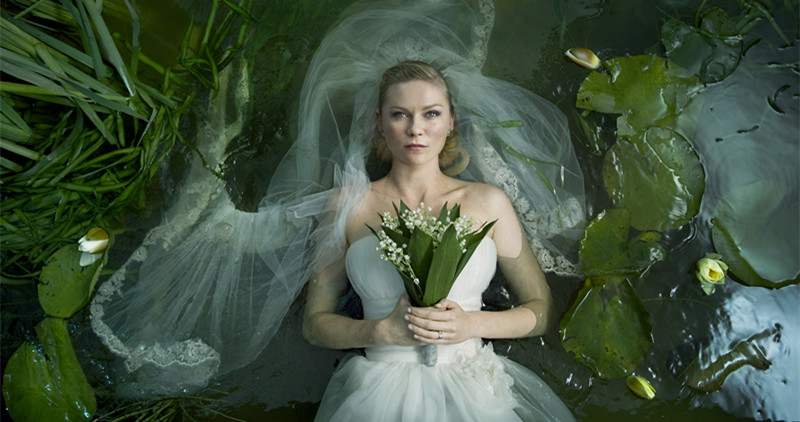
The masterpiece of Lars von Trier, “Melancholia” tells the story of two sisters facing the end of the world. It is divided into two halves, one for each sister.
In the first half, Justine’s half, we see a wedding reception. Justine has married a man named Michael. The lavish reception is held at Justine’s sister Claire’s husband John’s gargantuan and impressive estate, which features a gigantic mansion. Justine notices something strange in the sky, hovering in outer space.
Justine suffers from depression and between being overwhelmed by the ceremony, regretting her marriage, and having to stand her monstrous family (with the exception of Claire, John, and their small son, Leo, who adores her), she begins succumbing to a dark mental state. Claire scolds her and tells her she said she really wanted all of that and promised not to make any “scenes”.
However, she couldn’t care less. She leaves the reception, wanders around the estate, has sex with Tim (the very young assistant and nephew of her boss) in the middle of the huge gardens, brutally tells Jack what she really thinks of him and insults him, and then resigns, and, finally, refuses to consummate her marriage and dismisses Michael for good.
In the second half, Claire’s half, presumably after a few months have passed. John, Claire, Leo and Little Father (the family’s faithful and loyal butler) are at the estate. Justine is coming to stay for awhile, as her depression has worsened again to a very severe degree. She calls Claire because she’s unable to get into the taxi that will take her to the estate.
She arrives. She can barely keep her eyes open. Cries. Claire tries to bathe her in vain. She just sleeps. When Claire asks her to eat, she is unable and breaks down crying.
However, something else is going on. We know now a planet, which had been hiding behind the sun, has been discovered and named Melancholia. Panic is spreading about the possibility of it hitting Earth, and thus utterly destroying it.
The scientific community (including John, who has deep knowledge of astronomy) tries to calm people down saying Melancholia will just pass by, and it will be a magnificent view, which should be seen and celebrated by all.
Claire doesn’t believe this and is filled with anxiety, dread and terror, due to many people claiming online that Melancholia will indeed hit and destroy Earth and that the governments and the scientific community are lying. She’s so overpowered by dread that she even gets a bottle of to possibly commit suicide. John forbids her from using the computer and insists nothing bad will happen.
Claire and Justine have a conversation where Justine tells her that Melancholia will destroy Earth and that that’s a good thing, because “life on Earth is evil”, “we don’t need to grieve for it” and “no one will miss it”.
The day when Melancholia is supposed to pass by Earth comes and everybody sees it. However, after awhile, it doesn’t continue passing, but instead gets closer and closer to Earth.
Claire is hysterical. Justine is convinced Melancholia will hit and destroy Earth and thus relieved and happy and finally recovering from her depression, eating candy and marmalade, bathing herself, putting on clean clothes, and even smiling. She’s also calmed and relaxed.
The opposite is happening to Claire and John; John stops trying to fool himself and accepts the reality that Melancholia will indeed hit and destroy Earth and grabs Claire’s bottle of and kills himself. Claire finds him, loses her mind completely for awhile, after which she tries to resign herself to reality and then asks Justine in tears to join her and Leo at the terrace when the collision happens and have a glass of wine so that the three will be together when everything ends. Justine stoically and very cruelly mocks her and her plan and tells her she thinks her plan is “a piece of shit” and refuses.
Then she helps Leo build a small and minimal fortress made out of branches in the gardens. Claire sees them and joins them. The three get inside and hold hands. Leo keeps his eyes closed. Claire cries inconsolably. Justine looks at her. Melancholia hits Earth and destroys it. Everything ends.
4. The Merchant Of Four Seasons (Rainer Werner Fassbinder, 1971)
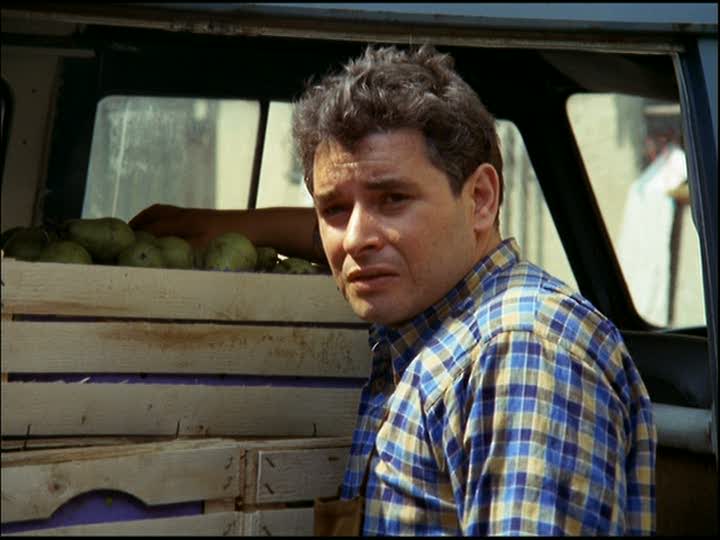
This is one of many examples of the great German Master’s pessimism.
The film tells the story of Hans, a poor man who earns his living selling fruit on the streets.
He comes back after spending years in the French Foreign Legion. His mother welcomes him by telling him: “The good die young; people like you come back”.
Hans has a wife, Irmgard, and a small daughter, Renate. Then we learn the truth. Hans is an alcoholic and he and Irmgard have a failed marriage and fight all the time. He’s filled with regrets and won’t let go of his days as a policeman, a job from which he was fired for accepting oral sex from a sex worker.
Hans then gets violent and abusive. Irmgard flees to Hans’ mother’s house where she is welcomed by his mother, his sisters and his brother-in-law and they all (with the exception of the youngest sister, Anna who’s kind and fair to him) agree that Hans has always been stupid and useless. Hans arrives at his mother’s house to get Irmgard, but his brother-in-law stops him and the two begin fighting. Irmgard calls a lawyer to get a divorce and Hans has a heart attack.
While Hans is recovering in the hospital, Irmgard prostitutes herself and takes her client to Hans’ and her apartment where little Renate sees them having sex.
Irmgard goes to the hospital and reconciles with Hans. When Hans comes back, Irmgard tells him she thinks he’s very funny because he’s short, much shorter than her, and that the only reason she started seeing him was because she found him so funny and laughable.
Due to the damage his heart attack had left on him, Hans isn’t able to drink and can no longer push his fruit cart around town, so he hires an assistant, who turns out to be Irmgard’s date from a few nights prior. Irmgard coerces the man into selling the fruit at more expensive prices without Hans’ knowledge and split the money earned with her. She does this to manipulate the man and so he won’t tell of their history together. Nevertheless, Hans learns of the betrayals of both Irmgard and the man and fires the latter.
Hans runs into an old friend who was with him at the French Foreign Legion and offers him the job Irmgard’s date had. He accepts and turns out to be much more productive selling the fruit and earning the business more money than Hans, Irmgard or the previous assistant ever did. This left Hans with too much free time and feeling utterly useless, even though his business is now more successful than it had ever been. He sinks further into grave depression.
He remembers the real love of his youth, a woman whose parents didn’t want to marry a fruit seller.
Hans tries to see Anna, the only one who truly cares about him, but she can’t see him because she’s busy with school.
Knowing that drinking could kill him due to his heart condition, he heads out to his favorite bar. Irmgard and his friend and new employee are with him. He talks about how in Morocco he was trapped and tortured by an Arab, but was rescued just in time by his comrades before being murdered, which is something he regrets, because he wanted to die.
He drinks until the alcohol kills him right there at the bar.
5. L’Argent (Robert Bresson, 1983)
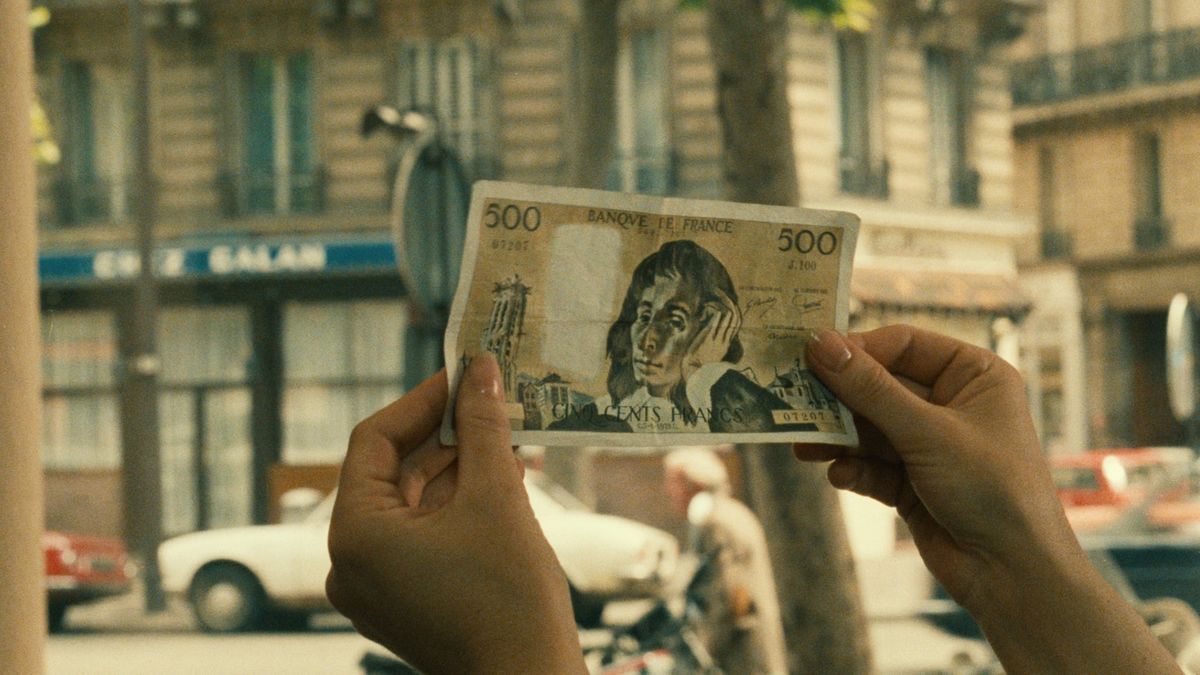
The last and possibly greatest masterpiece by the great giant Robert Bresson is based on Leo Tolstoy’s “The Forged Coupon”, published in 1912. It is a film so magnificent and brutal that no one who sees it will ever forget it.
The film starts with a teenager demanding his allowance from his father. The father gives him money but the teen complains that it’s too little. The father tells him to stop bothering him. The teen immediately leaves.
He then goes to a friend’s house, where the friend shows him a forged five hundred franc bill. They go to a photo shop and pay with the forged bill. The manager realizes the bill is forged and plans to get rid of it passing it to someone else.
Yvon, a gas delivery man, comes to the shop and is chosen by the people there to be the one to give the forged bill to.
After eating in a restaurant and trying to pay with the forged bill, the police is called and Yvon is arrested. He’s not condemned to serve time, however, he’s fired. Having no money and a wife and little daughter to take care of, in his desperation he participates in a bank robbery as the getaway driver.
The police arrive on time and Yvon is arrested and sentenced to three years behind bars. In prison he receives a letter from his wife, telling him their small daughter is dead after getting seriously ill and the mother being unable to pay for medical attention. His wife also informs him that she’s leaving him and doesn’t want to see him ever again.
At the prison cafeteria a fellow inmate attacks Yvon for no reason and due to him injuring the attacker, is sent to solitary confinement as punishment. There he keeps making noises all the time to upset the guards and stays awake during the night. He’s given tranquilizers regularly, which he doesn’t swallow but instead collects them until he has a considerable quantity. He then takes them all to commit suicide, but fails.
Time passes and Yvon’s sentence ends. He is now a man who has absolutely nothing. He goes to a motel to spend the night and at midnight murders the owners with an axe and robs their money.
After the murders he runs into a kind old woman who lets him stay at her and her family’s house. The woman’s family take advantage of her kindness, meekness and good nature and treat her as a servant, many times verbally and psychologically abusing her.
Yvon asks the woman what is she expecting in relation to the way her family treats her. She responds she doesn’t expect anything. He asks her why she doesn’t just drown herself in the river.
One night, when everybody is asleep, Yvon searches the house for money, but doesn’t find any. He then grabs an axe and starts murdering everybody, including a wheelchair-bound young boy. Finally, he arrives at the room of the old woman. She’s awake knowing what’s been going on. She’s sitting on her bed without moving, as if awaiting death. Yvon asks, “Where’s the money?!” and immediately after murders her with the axe, her blood splashing all over the wall.
Afterwards, Yvon goes to a restaurant and sits. The police are there. He gets up and says he’s just murdered an entire family. He’s arrested. The end.